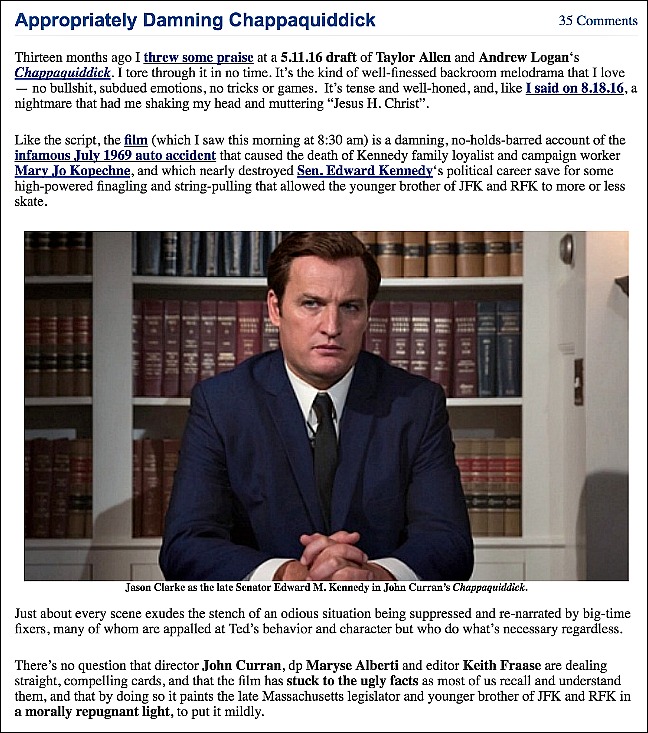I’m not beginning to suggest that anyone try to make commercial or award-season hay out of the pain and trauma of sexual abuse, but the fact is that John Curran‘s Chappaquiddick (Entertainment Studios, 12.8) is suddenly a film of the moment, and for recently developed reasons that its makers couldn’t have anticipated. What it’s about fits right into the current clamor.
A damning portrait of arrogant male power and the ultimate abuse of a female subordinate, Chappaquiddick was made last year for its own reasons, and is its own raison d’etre.
The story of the 1969 Chappquiddick tragedy is well-known and has been well-investigated, but Curran, producers Mark Ciardi, Chris Fenton and Campbell McInnes and screenwriters Taylor Allen and Andrew Logan wanted to deliver a concise but unequivocating version of this cold, tragic tale in a narrative form.

A critic friend who saw it last summer called it a “hit piece,” but Chappaquiddick has the cojones to call a spade a spade about a late, much beloved political figure, a respected liberal deal-maker and the most powerful and longest serving representative of what was, for decades, American’s premiere political family — the closest thing we ever had to a version of the British royals.
But since last month’s Toronto Film Festival and almost out of the blue, Chappaquiddick has arguably become an unwitting expression of a strong payback movement among tough female journalists and film industry progressives railing against the abusive use of male power, and not just in the form of odious sexual behavior.
Without design or intention, what Chappaquiddick said last year during its making, the portrait it created of a world-famous power abuser and blame-shifter suddenly fits right into what’s happening now with this and that alleged sexual abuser being taken to task and made to walk the public plank — Devin Faraci, Cinefamily’s Shadie Elnashai and Hadrian Belove, Harry Knowles and now Harvey Weinstein and — wait — Honest Trailer‘s creator Andy Signore..
Yeah, I know — who could have ever foreseen Faraci or Knowles being written about in the same sentence with the late Sen. Edward M. Kennedy? But here we are and facts are facts. There have been many legit complaints lodged against the afore-mentioned, but who has ever been more heinously abused than Mary Jo Kopechne? During an estimated two-hour period while Kopechne was still alive and gasping for air inside an upside-down Oldsmobile, EMK wasn’t calling for help (a local diver could’ve had her out of the car in minutes) but deciding that reporting the incident would result in his being found guilty of drunk driving, and so he didn’t call local authorities until the next morning.
I’m not suggesting that the producers should try to ride the current tide of “expose the latest liberal-minded sexual abuser and throw him to the lions” to further their commercial or award-season ambitions. But the fact is that Chappaquiddick is about a general syndrome (not sexual abuse as much as “powerful white men get to keep their power and privelege while the less powerful get paid off or brushed aside with their concerns swept under the rug”) that a lot of people are very angry about, and with justification. It’s suddenly a movie very much of the moment. Certainly among the Hollywood cognoscenti and the social-political tweeting class.
The wisest policy is for Team Chappaquiddick to say nothing and let journalists and industry audiences do the math on their own. But this is one of those times when a film seems to be saying exactly the right thing at exactly the right time.












